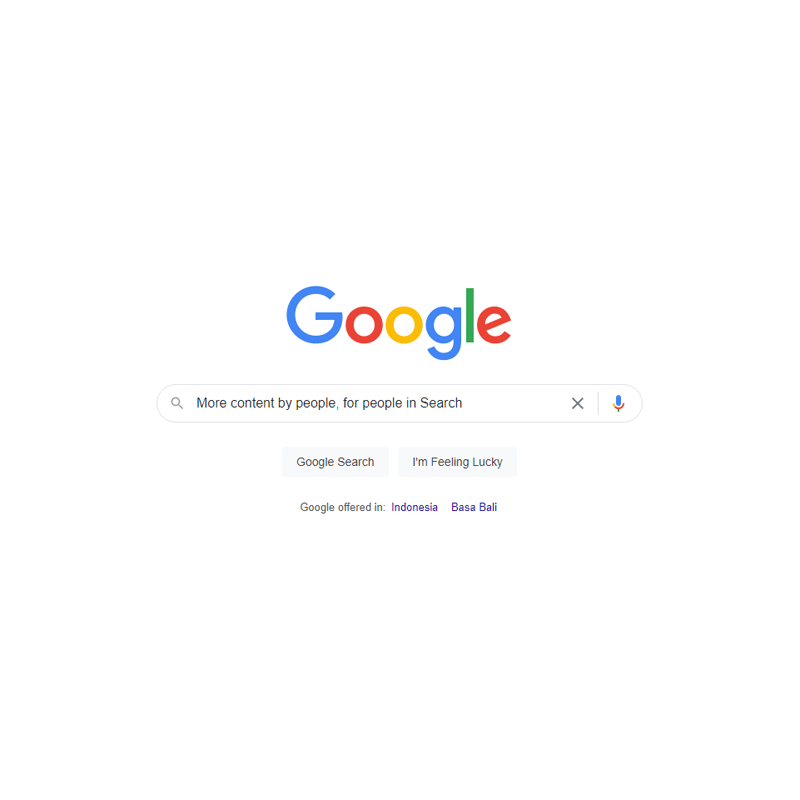
The internet is growing. And Google as the largest search engine of them all, is also growing with it.
The thing is, the web that becomes significantly larger by each coming days, if full of garbage and useless content. It's no longer a secret that most people who use Google Search to search for something, can often land on some web pages that don't answer their queries.
This annoys users, and also Google.
This happens because websites can earn money from visits and clicks.
Webmasters and web owners utilize this fact by creating content that exploits the weaknesses in Google, blackhat SEO and so forth, in order to make their web pages rank high in search engine results pages, even above legitimate and useful content.
As a result of this, some of the content might not have the insights people want, or it may not even seem like it was created for, or even by, a person.
Google makes thousands of tweaks to its search engines each year, and this time, it's making one big change.
And that change is to help its users "to find helpful content made by, and for, people."
Excited our "helpful content update" launches soon. Been watching team work hard on it, part of a broad continuing effort to bring more authentic info into Google Search. I'm on vacation this week but will try in few hours to answer questions I see, though our posts cover a lot. https://t.co/aj86MoXWqI
— Danny Sullivan (@dannysullivan) August 18, 2022
It has been Google's long-term goal to surface content created for people than search engines. But for more than many times, a lot of webmasters and web owners are exploiting its weaknesses, gaming the algorithms.
Google is not a truth engine. Because of this, Google wants to revise how its search algorithm work, by putting a better emphases on content primarily made for people, through what it calls the "helpful content update."
The tweak revises Google Search's web crawlers and the way Google indexes the web.
"Next week, we'll launch the 'helpful content update' to tackle content that seems to have been primarily created for ranking well in search engines rather than to help or inform people," said Danny Sullivan, public liaison for Google Search, in a blog post.
"This ranking update will help make sure that unoriginal, low quality content doesn’t rank highly in Search, and our testing has found it will especially improve results related to online education, as well as arts and entertainment, shopping and tech-related content."
To make this happen, the change in the algorithm is carried out by machine learning technology.
"This update introduces a new site-wide signal that we consider among many other signals for ranking web pages," Google explained.
" […] This classifier process is entirely automated, using a machine-learning model. It is not a manual action nor a spam action."
The news was delivered not long after Google's search results attracted more criticisms than usual.
Back in December 2021, for example, many users of the search engine expressed their dissatisfaction with low-quality results from queries related to programming code. They complained on how Google surfaced code snippets from low-quality websites, instead of of those hosted on reputable websites.
These "code snippet aggregators" show up on Google search results pages when people search for particular bits of programming code or error messages. The results appeared to have been scraped from sites with actual programming communities like Stack Overflow.
We're improving Search so you’re less likely to find content made for search engines, and more likely to find helpful, authentic information -- particularly for education, entertainment, shopping and tech content. See what else is new on Search. https://t.co/UnvcAHr36m
— Google (@Google) August 18, 2022
According to rivals, like Brave, this happens because "results pages in Big Tech search engines like Google are often cluttered with ads and automated content (or 'SEO spam') from marketers trying to game the system and increase the rank of their sites."
Google earns a lot of ads, and this is why its algorithms may surface sources that can earn the company higher revenue, by downplaying the sources' quality.
With the change, Google wants to ensure that people will have lesser chance to game its system again.
It's worth noting though, that Google is not going to banish all cynical clickbait traps that post useless garbage.
Google can still rank websites with unhelpful content if those sites present sufficiently "people-first" material in an algorithm-pleasing way. But knowing that people will find yet another of its weaknesses, the tech giant said that it will "continue refining how the classifier detects unhelpful content and launch further efforts to better reward people-first content."
Further reading: How Google Search Works, And How It Can Show You The Things You Want